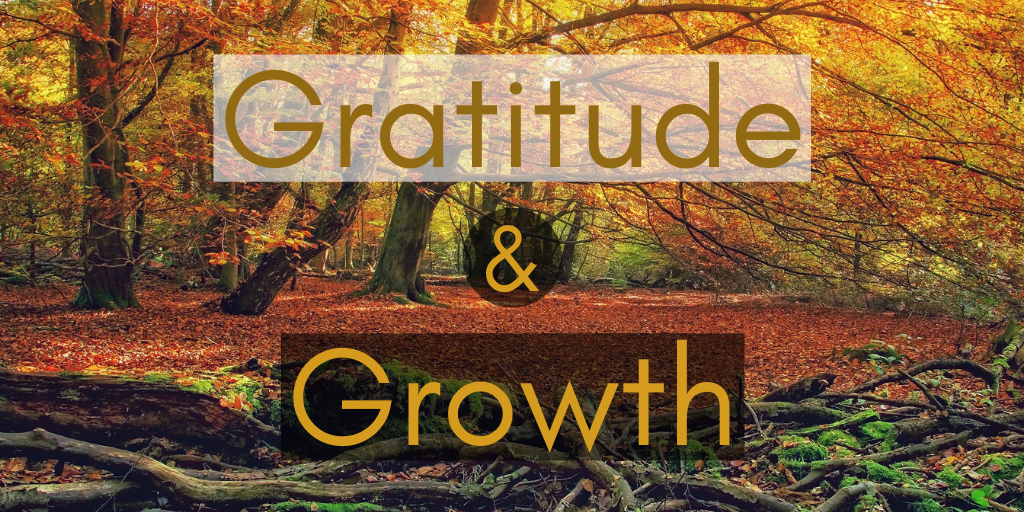
I’ve been writing about gratitude for the past two weeks in honor of the season of Thanksgiving. Today, as we look at gratitude and growth (or how to practice gratitude), I want to turn our attention to the word we use to denote this holiday, the word thanksgiving. It is a synonym of gratitude, and yet it is also made up of two words—thanks, giving—that offer a guide to the practice and growth of gratitude. Recognizing that for which we are thankful is one aspect of practicing gratitude. Giving to others as a result of that thankfulness is another aspect of gratitude.
Practicing gratitude means expressing thanks. Practicing gratitude also means giving.
Gratitude and Expressing Thanks
“Five minutes a day that can change your life.”
That’s how I once heard the Examen described. It sounds far too good to be true, but I’ve been practicing this five-minute exercise daily for a few months now, and it has indeed changed me.
The Examen originates with St. Ignatius back in the 16th century. The simple version is this: Take five minutes to reflect on your day.
To be more specific: At the end of the day, or in the morning, close your eyes and scan through the past 24 hours as if your life were a movie. What scenes come to mind? As you look back, look for times when you felt particularly alive, good, connected, and times when you felt stuck, disconnected, bad. Where did you experience love, joy, peace, patience (and on down the list of what Paul calls the fruit of the Spirit in Galatians 5)? Where did you experience fear, anger, guilt, anxiety? Ignatius called these moments “consolations” and “desolations.” The purpose of the practice is to begin noticing when you are experiencing the presence of God and when you are feeling as if God is absent.
Daily Consolations
For me, this practice of daily examen has helped me to notice God’s active presence in my life, and that recognition has led naturally into expressions of thanks. I thank God for the chance to use my body and see the beauty of my surroundings when I run. I thank God for car rides with our kids when we happen to have an important conversation. I thank God for the chance to use my gifts to write and speak and teach. I thank God for connecting with friends.
Daily Desolations
This practice has also led me to recognize the circumstances when I am likely to reject, ignore, or deny God’s active presence. Somewhat surprisingly, these moments of “desolation” have also led me to give thanks.
I am incredibly grateful that I have begun to see the moments when I am separating myself from the love of God. When I look back at a day and I notice not only that I snapped at Marilee for expressing disappointment, or I grumbled at Penny for not clearing her breakfast dishes, again, I start to ask questions about what led me to that place. When I notice my tight shoulders or other aches and pains that signal stress and anxiety, I wonder why I’ve turned towards worry when God invites me into trust.
In other words, noticing the “desolations” leads me back into God’s presence. I notice myself wandering away from God, which often leads me to confession. Confession leads me to give thanks for God’s love and mercy. Confession also leads me to give thanks that there is a way out of these places of despair and anger and fear.
There are plenty of ways to practice offering thanks to God. Writing a list at the end of each day. Sharing at the dinner table. Finding formal prayers of thanks. But for me, this practice of Examen has led me to a deeper expression of thanks both for the moments of deep connection to God and in the midst of my own daily inclinations to wander away from God’s forgiving love.
Gratitude and Generosity
Our son William has been playing soccer on the same local team for the past five years. It’s a scrappy, co-ed group of kids, and we often need to pull players from younger teams to fill our roster. But this season our team went undefeated, and after a come-from-behind win in the final game, the head coach summed it all up. He named each player and extolled them not only for their technical abilities but also for their hard work and their good attitudes.
As a parent, I was proud—of the team and of William’s contributions to it. But more than proud, I was grateful. And how did I want to express that gratitude? By giving the coaches gifts.
Gratitude prompts response, and that response begins with an expression of thanks (see above). It often continues through giving gifts.
The God of the cosmos, to whom we give thanks, invites us to express our gratitude not only with words of thanks but also through acts of generosity. Acts of generous giving offer us a way to let go of thinking that we deserve what we own. Giving changes our mindset from that of owners to that of stewards. (For more on this concept, I highly recommend Corey Widmer’s recent sermon series on stewardship.) And giving offers us a way to participate in God’s ongoing healing work within the broken places in our world.
Practice Generosity
Tomorrow, I’m going to run a guest post by Holly Nelson, one of the founders of the Special Hope Network, an organization we’ve been grateful to participate in from afar through financial support. Next week, I’m going to explain why we give where we give, not so that you’ll be compelled to do the same, but so that you can start thinking about where and how you might be called to give.
As I’ve written these past few weeks, gratitude is the antidote to grumpiness, true gratitude leaves room for grief, and gratitude emerges out of an understanding of grace, not in response to our own goodness. Finally, gratitude is a practice of both reflection and action that invites us into God’s abundant loving action in this world.
We are approaching the actual holiday we call Thanksgiving, where we commemorate a meal first celebrated hundreds of years ago. We will reflect on reasons to be thankful for our lives. We will pause to be together with friends and family. Thanksgiving is a time to respond to the gracious, good, ongoing provision of a God who loves us. Thanksgiving is also a time to remember that we are invited to practice gratitude all year long.
- Gratitude and Grumpiness
- Gratitude and Grief
- Gratitude and Grace
- Gratitude and Growth: How to Practice Gratitude
If you haven’t already, you can subscribe to receive regular updates and news. You can also follow me on Facebook, Instagram, Twitter, Pinterest, YouTube, and Goodreads, and you can subscribe to my Love Is Stronger Than Fear podcast on your favorite podcast platform.



